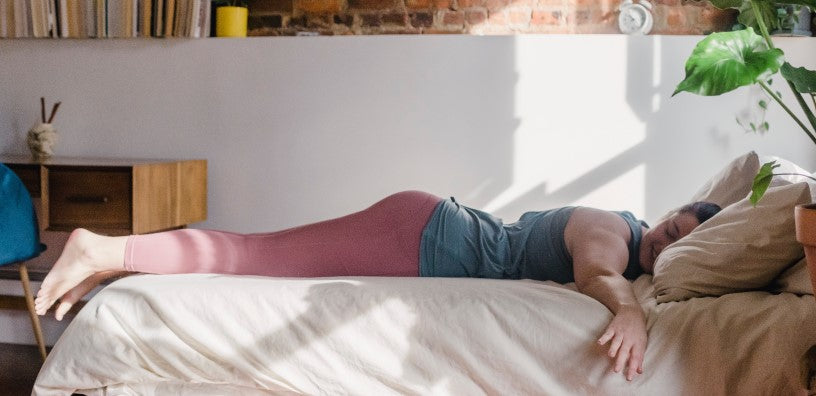
Impact of Sleep on Fitness
When people think about taking care of their bodies, they most often think about working out, eating healthy foods, drinking water, and even performing skincare routines. However, people may forget that sleep, as simple as it is, is detrimental to your physical and mental health. Not getting enough sleep affects your circadian rhythm, throwing off your entire day and making you feel out of place in your own body.
On average, adults should be sleeping around 7-9 hours every night in order to rest the body from all it has endured, as well as to get ready for the next day [1]. However, over 70 million Americans are sleep deprived, affecting how they work, eat, and feel throughout the day [2]. Even though they are having trouble sleeping, as they make their way to the gym, they do not realize that the lack of sleep affects their ability to get in shape.
Keep reading to find out more about how sleeping habits affect your workout!
Effects of Sleep Deprivation
Without sleep, you are unable to fully perform any task. Sleep deprivation affects your ability to think clearly, your appearance, and even the way you drive, so it's no surprise to see it also affects your ability to exercise. Without sleep, we simply have no energy for anything. Serious effects from sleep deprivation include the following [3]:
- Diabetes
- High blood pressure
- Heart attack
- Obesity
- Depression
Sleep deprivation can also affect your daily life in smaller ways, although still impactful. From under-eye bags to possibly dozing off while driving, a lack of sleep can cause negative effects for ourselves and those around us. It is safe to say that getting the appropriate amount of sleep is crucial to your health and well-being.

No Sleep = No Energy
As previously mentioned, sleep is detrimental to helping you continue your daily routine. In regards to exercising, sleep deprivation reduces your energy to fully benefit from a workout. Although you're still working your muscles, your body is more easily tired, increasing your fatigue and reducing the time you can spend exercising [4].
Additionally, if you fight through your fatigue and continue exercising, you are overworking your body and your exercise efficiency will decrease [5]. Without rest, your body will not function to its full potential, causing poor effects in the long run.
Exercise Demands Sleep
In order for exercise to work, you must sleep. Even when exercising, your body itself will demonstrate how much it needs to rest. When the body is physically active, it increases adenosine in the brain. Adenosine is a chemical that causes us to feel sleepy [6]. So if you are not getting the proper amount of sleep, your body will make sure it gets as much as you allow it to.
Circadian Rhythm
Your body has a biological clock, also known as the circadian rhythm. The circadian rhythm is a 24-hour cycle that your body follows to determine when to wake up and fall asleep. It follows environmental factors, like sunlight and darkness to determine sleep. When we stay awake or sleep in, our rhythms are disrupted, affecting us for the rest of the day [7].
Establishing an exercise routine helps your body realize when it is time for waking and sleeping. Studies have even shown that a well-established exercise routine can shift your circadian rhythm [8]. Additionally, morning people are more likely to be active in the morning, using exercise to wake up their bodies, while those who sleep in are more active at night, crashing after their workout. Studies find that the more sleep you get, the more likely you are to exercise routinely [9].

So now we’ve fully established that sleep has critical effects on your ability to exercise. In order to maximize your workout, here's what you can do to improve your sleeping habits:
- Avoid electronics for at least 30 minutes before bed: The blue light emitted by electronics such as phones and computers mimics sunlight, therefore tricking your body into thinking it's time to wake up. This throws off your circadian rhythm, further affecting your sleep quality [10].
- Establish a consistent sleeping schedule: By waking up and sleeping at the same time every day, your body will adjust and allow you to get the appropriate amount of sleep (and waking up at the same time on weekends will make it easier to wake up on Monday mornings).
- Keep a consistent nighttime routine: Now that you’re no longer using your phone before bed, other relaxing bedtime habits include reading a book, performing a skincare routine, stretching, taking a bath, journaling, etc.
- Invest in quality bedding: Oftentimes poor quality sleep comes from poor bedding. Cosy House offers a variety of bedding products, such as the Luxury Bed Sheets, that are light and breathable for endless comfort, therefore reducing your chances of waking up in the middle of the night.
- Avoid certain foods before bed: Skipping spicy foods, caffeine, and processed foods before bed can help you fall asleep faster by avoiding effects such as acid reflux, bloating, and other disruptions.
Ready to see positive changes in your exercise routine? A proper night’s sleep might just be the key to optimizing your workout. The more energy you have, the more your body will thank you!
Click here to learn more about Cosy House can help you get better z’s.
We've gone ahead & enclosed a 10% off coupon below for you to use if you'd like to take the plunge and try out our sheets for yourself! To shop our collection & get 10% OFF Use the code 'BLOG10' at checkout.
Sources:
-
Centers for Disease Control and Prevention. (2017, March 2). CDC - how much sleep do I need? - sleep and sleep disorders. Centers for Disease Control and Prevention. Retrieved from https://www.cdc.gov/sleep/about_sleep/how_much_sleep.html
-
Centers for Disease Control and Prevention. (2017, June 5). CDC - about our program - sleep and sleep disorders. Centers for Disease Control and Prevention. Retrieved from https://www.cdc.gov/sleep/about_us.html#:~:text=About%2070%20million%20Americans%20suffer,costs%2C%20and%20lost%20work%20productivity.
-
Cleveland Clinic. (2022, March 25). Here's what happens when you don't get enough sleep (and how much you really need a night). Cleveland Clinic. Retrieved from https://health.clevelandclinic.org/happens-body-dont-get-enough-sleep/#:~:text=Some%20of%20the%20most%20serious,function%20and%20lower%20sex%20drive.
-
Oliver, S. J., Costa, R. J. S., Laing, S. J., Bilzon, J. L. J., & Walsh, N. P. (2009, June 20). One night of sleep deprivation decreases treadmill endurance performance - European Journal of Applied Physiology. SpringerLink. Retrieved from https://link.springer.com/article/10.1007/s00421-009-1103-9?utm_medium=affiliate&utm_source=commission_junction&CJEVENT=5246718c079811ed82788eda0a82b832
-
Vitale, K. C., Owens, R., Hopkins, S. R., & Malhotra, A. (2019, August). Sleep hygiene for optimizing recovery in athletes: Review and recommendations. International journal of sports medicine. Retrieved from https://www.ncbi.nlm.nih.gov/pmc/articles/PMC6988893/
-
Mateo, A., Chai, C., Bedosky, L., Sullivan, K., Asp, K., Byrne, C., Millard, E., & Emanuelli, A. (2018, May 23). How sleep affects fitness and vice versa. EverydayHealth.com. Retrieved from https://www.everydayhealth.com/fitness/intimate-relationship-between-fitness-sleep/
-
Johnson, J. (2021, January 11). Circadian rhythms: How it works, what affects it, and more. Medical News Today. Retrieved from https://www.medicalnewstoday.com/articles/circadian-rhythms#how-it-works
-
Pacheco, D. (2022, May 6). How can exercise affect sleep? Sleep Foundation. Retrieved from https://www.sleepfoundation.org/physical-activity/exercise-and-sleep
-
Cleveland Clinic. (2022, May 20). 3 reasons to ditch your phone before bed. Cleveland Clinic. Retrieved from https://health.clevelandclinic.org/put-the-phone-away-3-reasons-why-looking-at-it-before-bed-is-a-bad-habit/#:~:text=The%20light%20from%20your%20phone%20screen%20can%20have%20an%20impact&text=Studies%20have%20shown%20that%20the,tune%20with%20light%20and%20dark.
-
VanHelder , T., & Radomski, M. W. (n.d.). Sleep deprivation and the effect on Exercise Performance. Sports medicine (Auckland, N.Z.). Retrieved from https://pubmed.ncbi.nlm.nih.gov/2657963/
-
PC;, Z., Baron, K. G., & Reid , K. J. (n.d.). Exercise to improve sleep in insomnia: Exploration of the bidirectional effects. Journal of clinical sleep medicine : JCSM : official publication of the American Academy of Sleep Medicine. Retrieved from https://pubmed.ncbi.nlm.nih.gov/23946713/
-
ASA Authors & Reviewers. (n.d.). The 11 worst foods to eat before bed. American Sleep Association. Retrieved from https://www.sleepassociation.org/blog-post/the-11-worst-foods-to-eat-before-bed/

